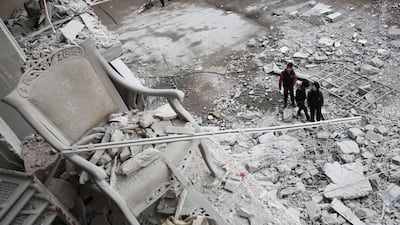Last week the head of the Russian National Defence Management Centre, colonel general Mikhail Mizintsev, said Russia had sent formal proposals to Washington on US-Russian efforts to fund the reconstruction of Syria, which would facilitate the return of millions of Syrian refugees to the country.
Col Gen Mizintsev's comments suggested that Donald Trump had agreed with Vladimir Putin at their meeting in Helsinki to participate in Syria's reconstruction, which would be at odds with the official American position until now. Soon after, a US National Security Council spokesman walked back any impression of collaboration, noting: "There were no commitments to undertake any concrete action, beyond agreement that both sides should continue discussions."
Yet even this indicated some ambiguity on Washington’s part on a vital question that will come up in Syria once the conflict there ends: will countries that were opposed to President Bashar Al Assad’s regime for having engaged in war crimes and crimes against humanity be willing to finance Syrian reconstruction, in a way that consolidates the regime’s hold over the country?
Despite claims from many governments that they would never bolster Mr Al Assad, there are reasons to suppose attitudes may change. The main reason is refugees. After meeting German Chancellor Angela Merkel last May, Mr Putin made the link, declaring that Europe's financing of Syria's reconstruction would allow a return of Syrian refugees from Europe. The Russian president called on European states "not to politicise" the reconstruction debate.
Mr Putin's remarks could also be read as a threat. Were the Europeans to refuse to assist Syria financially, he implied, they could face a situation similar to the one in 2015. Mr Al Assad would shut the door on any returnees so that millions of desperate refugees, eager to leave their miserable places of refuge in the Middle East, would instead seek to migrate to a prosperous Europe. The only way to avert this would be to create conditions for the refugees to go home.
This creates a profound fear in Europe and even European officials will quietly suggest that principle might be tossed to the wind. Nor are they necessarily alone. While the Russians have taken a more circumspect position with the Americans, one could expect that in their conversations, the terrorism argument will be used: that a large, rootless refugee population will heighten resentment and create conditions facilitating the recruitment of Syrians by terrorist groups.
However, if the Europeans (and possibly the Americans) fold, one can expect the Assad regime to exploit this to the fullest. For a good sense of what it might do, one need only look at how the regime manipulated humanitarian aid during the Syrian conflict. At every turn, its aim was to funnel all outside aid through regime-approved institutions or non-governmental organisations, making the regime an indispensable interlocutor and ensuring it could retain and enhance its power.
The Europeans, if they were to decide to fund reconstruction, would likely try to preserve a modicum of self-respect and deniability by not operating through regime bodies. Some kind of mechanism could be created to keep alive the illusion of not collaborating. Perhaps the Syrians, at Russia’s urging, would set up non-state bodies or private companies made up of private sector businessmen to dispense outside money. Such bodies or companies would be closely tied to the regime but without being identified as such.
_______________________
Read more from Michael Young:
Trump is using the same process as Obama in the Middle East
Rise of Hezbollah is the price Lebanon has paid for a post-civil war order
Trump needs to define achievable political objectives in Syria
_______________________
Ironically, the recent furore over the Syrian government's passage of Law 10 may hint at a ready means of doing so. The law allows for the creation of property companies to redevelop areas destroyed during the conflict. While attention was focused on how the law could be used to engage in sectarian cleansing, there was little discussion of how the companies might be used to funnel reconstruction funds outside formal regime channels, in such a way that they could be portrayed as direct transfers to the private sector.
The Russians are aware that reconstruction will be essential in solidifying Mr Al Assad's rule and that neither they nor Iran have the money to do so on their own. Western countries, they realise, must participate and given the potential profits, there is likely to be interest under a facade of disapproval. Governments and private companies will find ways of justifying reconstruction funding.
After all, no one held it against Lebanon that its post-war political class was made of one-time warlords with blood on their hands, as western companies invested in reconstruction after 1990. That is why Mr Putin’s words will likely resonate in Europe and the US, where populations have shown uncertainty, not to say open hostility at times, towards Mr Al Assad’s victims.
Some time ago it became clear that Mr Al Assad was likely to get away with murder in Syria. The US under Barack Obama and Mr Trump has done little to make him pay for his regime’s crimes. The European Union regarded the massive arrival of Syrians and others as an existential crisis, one that could undermine the foundations of the EU. Mr Putin knows all this, which is why he is pressing ahead with his threats. He can sense that he is facing paper tigers.
Michael Young is editor of Diwan, the blog of the Carnegie Middle East programme, in Beirut


